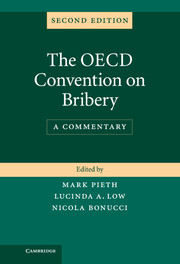Book contents
- Frontmatter
- Contents
- Notes on Contributors
- Foreword
- Acknowledgements
- Abbreviations
- Part I Introduction
- Part II Commentary
- Article 1 The Offence of Bribery of Foreign Public Officials
- Article 2 The Responsibility of Legal Persons
- Article 3 Sanctions
- Article 3(3) Seizure and Confiscation
- Article 4 Jurisdiction
- Article 5 Enforcement
- Article 6 Statute of Limitations
- Article 7 Money Laundering
- Article 8 Accounting
- Articles 9–11 International Co-operation
- Article 12 Monitoring and Follow-up
- Articles 13–17 Final Provisions
- Part III The Convention in Practice
- Annex OECD Documents
- Consolidated Bibliography
- Index
- References
Article 4 - Jurisdiction
from Part II - Commentary
Published online by Cambridge University Press: 05 March 2015
- Frontmatter
- Contents
- Notes on Contributors
- Foreword
- Acknowledgements
- Abbreviations
- Part I Introduction
- Part II Commentary
- Article 1 The Offence of Bribery of Foreign Public Officials
- Article 2 The Responsibility of Legal Persons
- Article 3 Sanctions
- Article 3(3) Seizure and Confiscation
- Article 4 Jurisdiction
- Article 5 Enforcement
- Article 6 Statute of Limitations
- Article 7 Money Laundering
- Article 8 Accounting
- Articles 9–11 International Co-operation
- Article 12 Monitoring and Follow-up
- Articles 13–17 Final Provisions
- Part III The Convention in Practice
- Annex OECD Documents
- Consolidated Bibliography
- Index
- References
Summary
Jurisdiction
Each Party shall take such measures as may be necessary to establish its jurisdiction over the bribery of a foreign public official when the offence is committed in whole or in part in its territory.
Each Party which has jurisdiction to prosecute its nationals for offences committed abroad shall take such measures as may be necessary to establish its jurisdiction to do so in respect of the bribery of a foreign public official, according to the same principles.
When more than one Party has jurisdiction over an alleged offence described in this Convention, the Parties involved shall, at the request of one of them, consult with a view to determining the most appropriate jurisdiction for prosecution.
Each Party shall review whether its current basis for jurisdiction is effective in the fight against the bribery of foreign public officials and, if it is not, shall take remedial steps.
Official Commentaries
Article 4 – Jurisdiction
The territorial basis for jurisdiction should be interpreted broadly so that an extensive physical connection to the bribery act is not required.
Nationality jurisdiction is to be established according to the general principles and conditions in the legal system of each Party. These principles deal with such matters as dual criminality. However, the requirement of dual criminality should be deemed to be met if the act is unlawful where it occurred, even if under a different criminal statute. For countries which apply nationality jurisdiction only to certain types of offences, the reference to ‘principles’ includes the principles upon which such selection is based.
- Type
- Chapter
- Information
- The OECD Convention on BriberyA Commentary, pp. 322 - 348Publisher: Cambridge University PressPrint publication year: 2013
References
- 1
- Cited by



